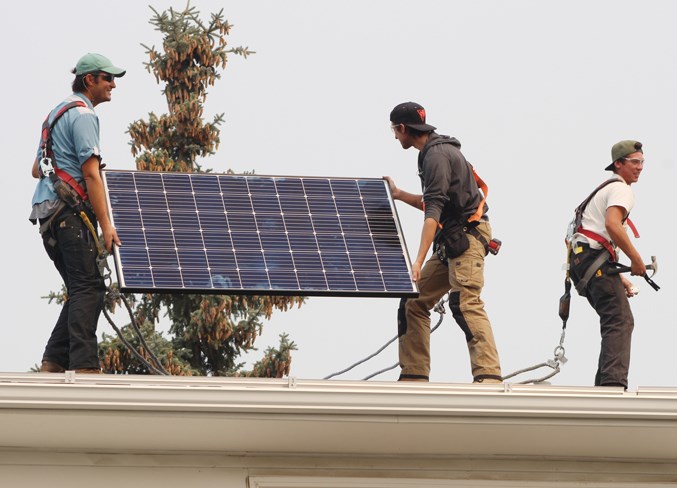A Cochrane couple is banking on sunny days ahead. Hugh and Peggy Maloney recently had solar panels fixed onto their family home and expect to produce 103 per cent of their energy needs. While it doesn't mean a complete elimination of a power bill (there's still administration and other fees) the bill will be significantly lower. The family expects the savings will pay off the investment in the panels over 15 years. "I always wanted to get solar panels because I think it's really important to walk the talk and demonstrate that you can generate your own electricity right on your roof," said Peggy. "We've had a variety of different homes and this is the first one that's really been perfectly situated for it." Peggy said their new home, which they moved into after moving to Cochrane from Yellowknife, is in a perfect position – there are no trees blocking the roof and it's south facing. "We're really maximizing the use of the solar panels," she said. Sky Fire Energy Inc, the company installing the panels for the Maloney family, said the PV (photo voltaic) system reduces or avoids the retail rate for electricity while also increases the savings in transmission and distribution charges (variable charges). The owners can get credit for the leftover energy that is exported to the main grid. "A solar PV system pays for itself via the savings on electricity bills each month," said Greg Sauer, a sales representative from Sky Fire Energy. Buying and installing the panels was not cheap – the total cost for the panels was close to $14,000 including taxes, though for the family it cost under $10,000 once the provincial Residential and Commercial Solar Program Grant was applied. The cost recovery from the system can vary depending on factors such as the slope of the roof or the position of the house. However, owners can benefit from having locked-in energy prices in what Sauer calls "high, volatile pricing" in Alberta's energy market, which is deregulated. "A customer can effectively lock in the price of power for a period of 30+ years. If the price of power from the grid skyrockets due to market forces, government policy (e.g. carbon tax), etc, solar PV customers, especially those who are at or near net zero on an annual basis will avoid those impacts," Sauer explained. "Solar PV systems are, without question, a longer-term investment and likely of little interest to those expecting a quick payback. However, as the price of electricity rises as it has in 2018, those monthly and annual savings accrue quicker enhancing the payback." To date, there have been 770 residences, commercial facilities and non-profit organizations in Alberta given grants totaling $4.9 million and representing 6.9 megawatts of solar capacity. The program, which was originally pegged at $36 million, launched in June 2017 and grants are still available. According to the province, it has helped fuel 900 jobs in Alberta’s solar sector. For the Maloney's, reaping the environmental benefits was one reason they chose to get panels. "For me as an adult, you want to teach your kids about being sustainable and one of the things we use a lot of is energy. If you can teach your kids to be constantly thinking about what they're using and why they're using it and be a little more sustainable, their life is going to be easier in many ways," Hugh said. Lowering energy costs is also just smarter, Hugh explained and adds money to the family's pocket. "I grew up on a farm and you're always dealing with, not necessarily energy, but sustainability concepts. Whatever you take out of the system has to be put back in somehow. On a farm, you're paying for that, you know fuel in your tractors, fuel in your engine, electricity for your barns. The more sustainable you can be, the better off you are as a business in the long run," he said. "Households can sort of be thought of as a small business, you're paying to live in your house and you're paying for your energy. So if you can lower your energy costs, at the end of the day you should have more money to play in the mountains or do other stuff." It's not the only initiative the family is doing to lower their homes energy use, they're also working on smaller fixes like re-sealing doors and adding insulation to their roof. Peggy said going solar is something all Canadians should consider. "It's not a new thing, it's not an outrageous thing to put solar panels on, we're just a little bit behind here in Canada."




